Kolb's Experiential Learning Theory and Styles for Professionals
VerifiedAdded on 2023/06/13
|7
|2126
|55
Essay
AI Summary
This essay explores the significance of learning theories, focusing on Kolb's experiential learning theory and the importance of understanding diverse learning styles for employees, line managers, and learning and development specialists. It highlights Kolb's theory as a foundational tool for creating knowledge through experience, emphasizing its relevance in designing effective training interventions. The essay also discusses how understanding different learning styles can enhance team building, improve communication, and promote professional development by tailoring training programs to individual preferences. It concludes that a comprehensive understanding of learning styles enables managers and employees to enhance learning capabilities and create a more productive learning environment, bridging the gap between theoretical knowledge and practical application.
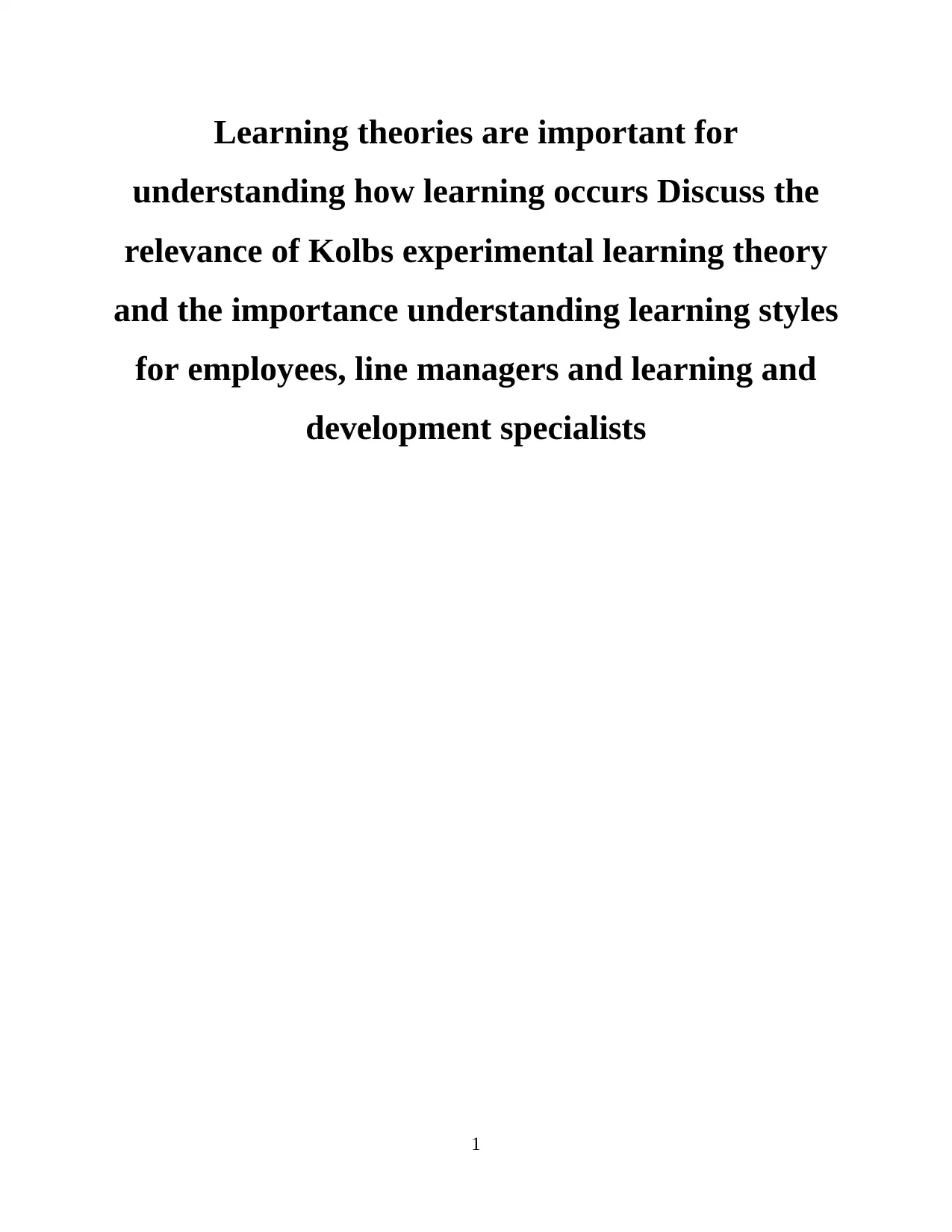
Learning theories are important for
understanding how learning occurs Discuss the
relevance of Kolbs experimental learning theory
and the importance understanding learning styles
for employees, line managers and learning and
development specialists
1
understanding how learning occurs Discuss the
relevance of Kolbs experimental learning theory
and the importance understanding learning styles
for employees, line managers and learning and
development specialists
1
Paraphrase This Document
Need a fresh take? Get an instant paraphrase of this document with our AI Paraphraser
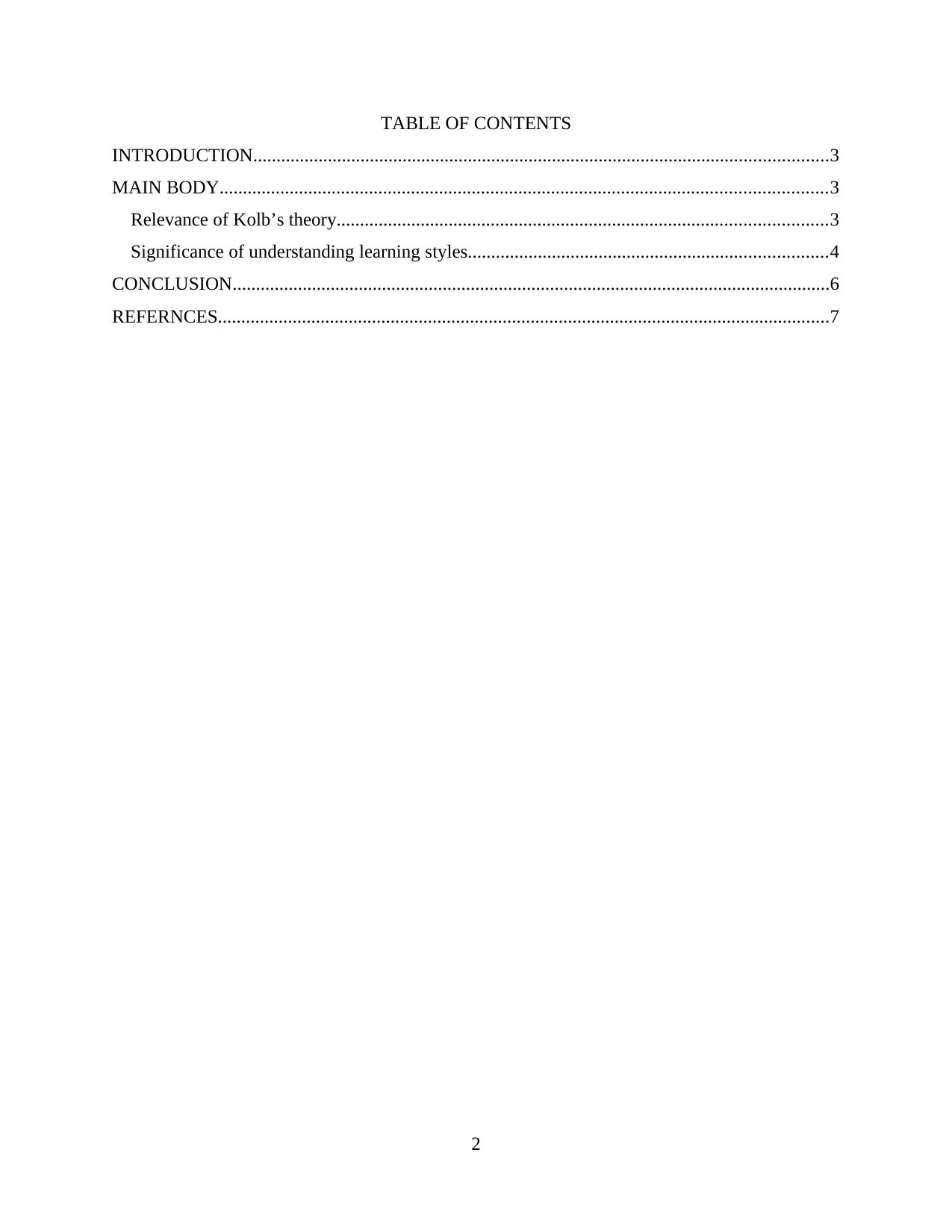
TABLE OF CONTENTS
INTRODUCTION...........................................................................................................................3
MAIN BODY..................................................................................................................................3
Relevance of Kolb’s theory.........................................................................................................3
Significance of understanding learning styles.............................................................................4
CONCLUSION................................................................................................................................6
REFERNCES...................................................................................................................................7
2
INTRODUCTION...........................................................................................................................3
MAIN BODY..................................................................................................................................3
Relevance of Kolb’s theory.........................................................................................................3
Significance of understanding learning styles.............................................................................4
CONCLUSION................................................................................................................................6
REFERNCES...................................................................................................................................7
2
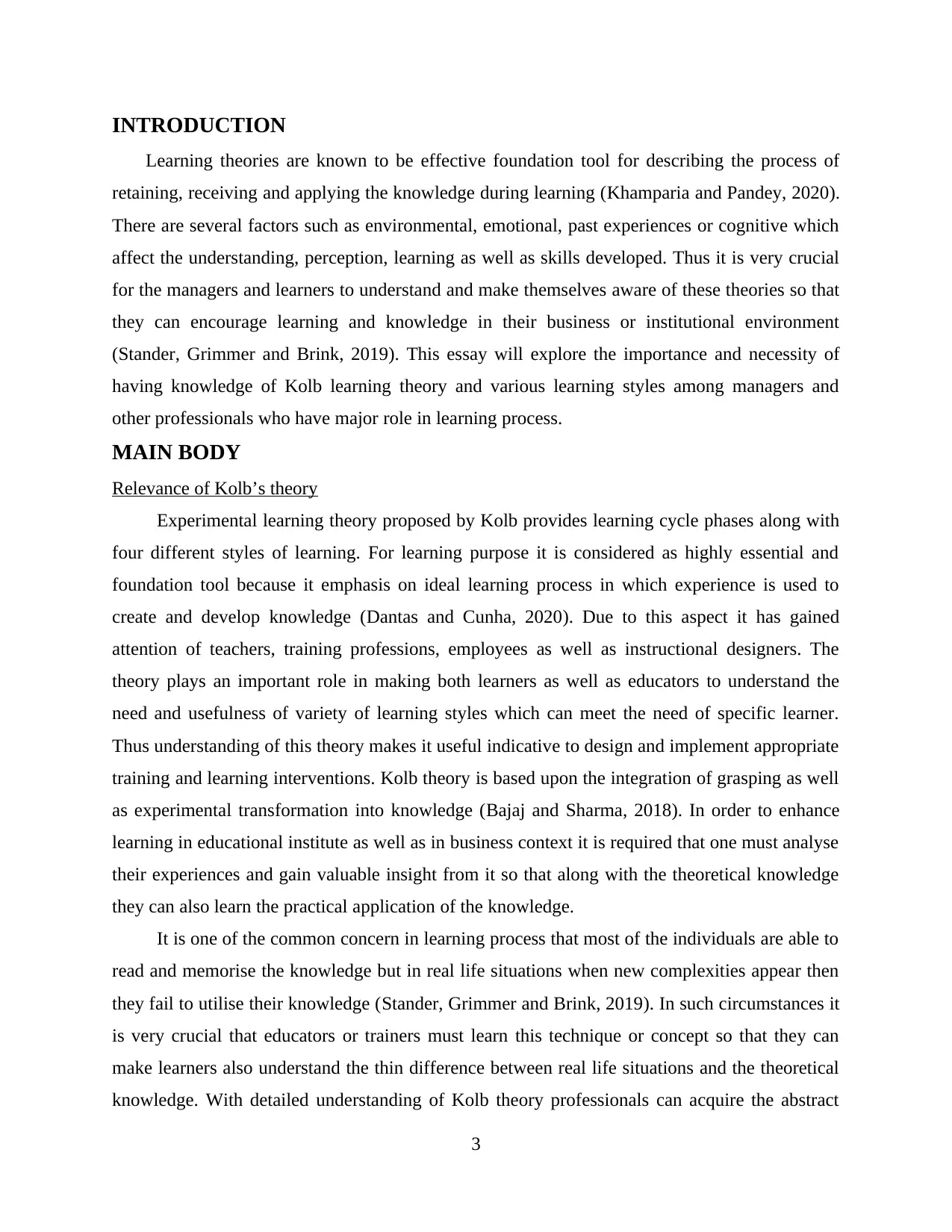
INTRODUCTION
Learning theories are known to be effective foundation tool for describing the process of
retaining, receiving and applying the knowledge during learning (Khamparia and Pandey, 2020).
There are several factors such as environmental, emotional, past experiences or cognitive which
affect the understanding, perception, learning as well as skills developed. Thus it is very crucial
for the managers and learners to understand and make themselves aware of these theories so that
they can encourage learning and knowledge in their business or institutional environment
(Stander, Grimmer and Brink, 2019). This essay will explore the importance and necessity of
having knowledge of Kolb learning theory and various learning styles among managers and
other professionals who have major role in learning process.
MAIN BODY
Relevance of Kolb’s theory
Experimental learning theory proposed by Kolb provides learning cycle phases along with
four different styles of learning. For learning purpose it is considered as highly essential and
foundation tool because it emphasis on ideal learning process in which experience is used to
create and develop knowledge (Dantas and Cunha, 2020). Due to this aspect it has gained
attention of teachers, training professions, employees as well as instructional designers. The
theory plays an important role in making both learners as well as educators to understand the
need and usefulness of variety of learning styles which can meet the need of specific learner.
Thus understanding of this theory makes it useful indicative to design and implement appropriate
training and learning interventions. Kolb theory is based upon the integration of grasping as well
as experimental transformation into knowledge (Bajaj and Sharma, 2018). In order to enhance
learning in educational institute as well as in business context it is required that one must analyse
their experiences and gain valuable insight from it so that along with the theoretical knowledge
they can also learn the practical application of the knowledge.
It is one of the common concern in learning process that most of the individuals are able to
read and memorise the knowledge but in real life situations when new complexities appear then
they fail to utilise their knowledge (Stander, Grimmer and Brink, 2019). In such circumstances it
is very crucial that educators or trainers must learn this technique or concept so that they can
make learners also understand the thin difference between real life situations and the theoretical
knowledge. With detailed understanding of Kolb theory professionals can acquire the abstract
3
Learning theories are known to be effective foundation tool for describing the process of
retaining, receiving and applying the knowledge during learning (Khamparia and Pandey, 2020).
There are several factors such as environmental, emotional, past experiences or cognitive which
affect the understanding, perception, learning as well as skills developed. Thus it is very crucial
for the managers and learners to understand and make themselves aware of these theories so that
they can encourage learning and knowledge in their business or institutional environment
(Stander, Grimmer and Brink, 2019). This essay will explore the importance and necessity of
having knowledge of Kolb learning theory and various learning styles among managers and
other professionals who have major role in learning process.
MAIN BODY
Relevance of Kolb’s theory
Experimental learning theory proposed by Kolb provides learning cycle phases along with
four different styles of learning. For learning purpose it is considered as highly essential and
foundation tool because it emphasis on ideal learning process in which experience is used to
create and develop knowledge (Dantas and Cunha, 2020). Due to this aspect it has gained
attention of teachers, training professions, employees as well as instructional designers. The
theory plays an important role in making both learners as well as educators to understand the
need and usefulness of variety of learning styles which can meet the need of specific learner.
Thus understanding of this theory makes it useful indicative to design and implement appropriate
training and learning interventions. Kolb theory is based upon the integration of grasping as well
as experimental transformation into knowledge (Bajaj and Sharma, 2018). In order to enhance
learning in educational institute as well as in business context it is required that one must analyse
their experiences and gain valuable insight from it so that along with the theoretical knowledge
they can also learn the practical application of the knowledge.
It is one of the common concern in learning process that most of the individuals are able to
read and memorise the knowledge but in real life situations when new complexities appear then
they fail to utilise their knowledge (Stander, Grimmer and Brink, 2019). In such circumstances it
is very crucial that educators or trainers must learn this technique or concept so that they can
make learners also understand the thin difference between real life situations and the theoretical
knowledge. With detailed understanding of Kolb theory professionals can acquire the abstract
3
⊘ This is a preview!⊘
Do you want full access?
Subscribe today to unlock all pages.

Trusted by 1+ million students worldwide
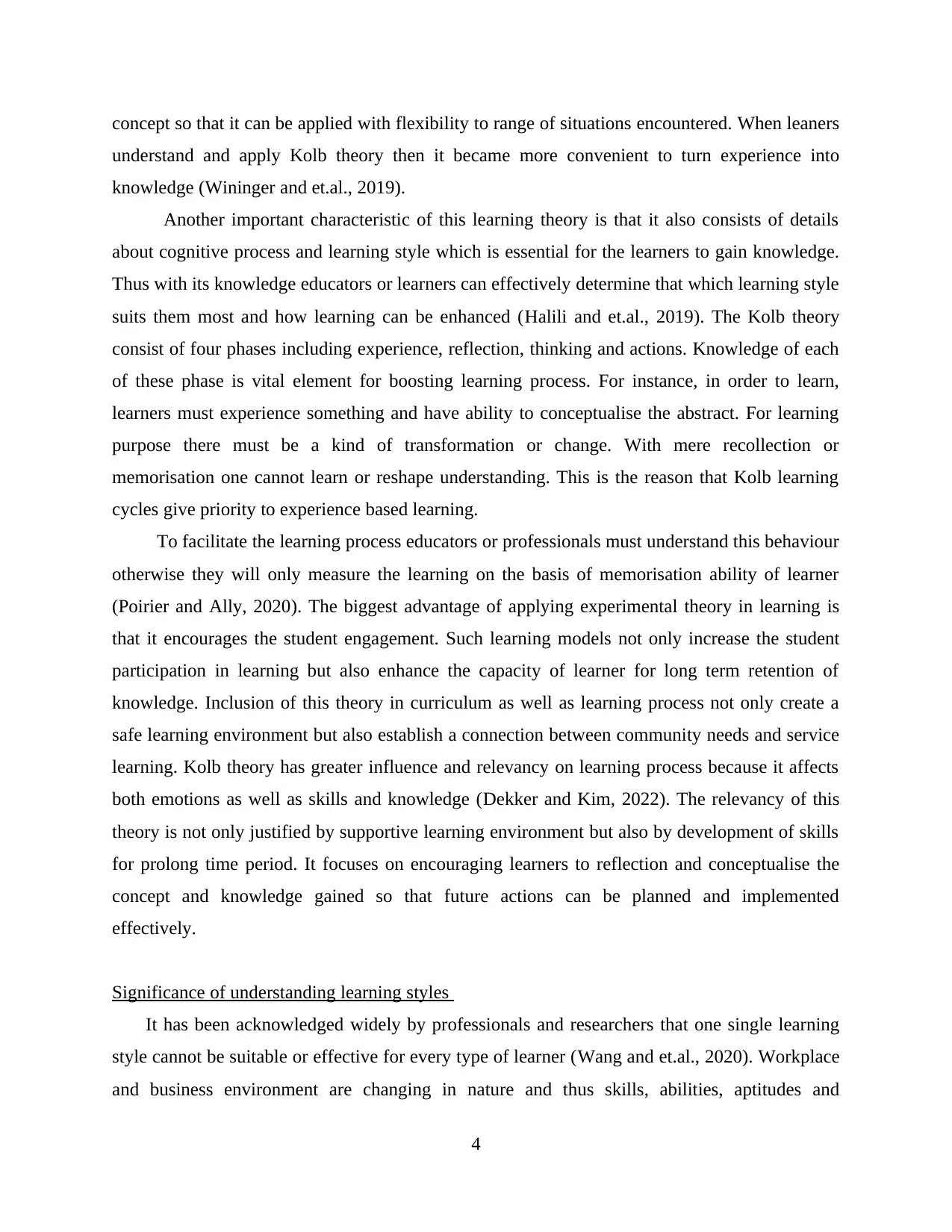
concept so that it can be applied with flexibility to range of situations encountered. When leaners
understand and apply Kolb theory then it became more convenient to turn experience into
knowledge (Wininger and et.al., 2019).
Another important characteristic of this learning theory is that it also consists of details
about cognitive process and learning style which is essential for the learners to gain knowledge.
Thus with its knowledge educators or learners can effectively determine that which learning style
suits them most and how learning can be enhanced (Halili and et.al., 2019). The Kolb theory
consist of four phases including experience, reflection, thinking and actions. Knowledge of each
of these phase is vital element for boosting learning process. For instance, in order to learn,
learners must experience something and have ability to conceptualise the abstract. For learning
purpose there must be a kind of transformation or change. With mere recollection or
memorisation one cannot learn or reshape understanding. This is the reason that Kolb learning
cycles give priority to experience based learning.
To facilitate the learning process educators or professionals must understand this behaviour
otherwise they will only measure the learning on the basis of memorisation ability of learner
(Poirier and Ally, 2020). The biggest advantage of applying experimental theory in learning is
that it encourages the student engagement. Such learning models not only increase the student
participation in learning but also enhance the capacity of learner for long term retention of
knowledge. Inclusion of this theory in curriculum as well as learning process not only create a
safe learning environment but also establish a connection between community needs and service
learning. Kolb theory has greater influence and relevancy on learning process because it affects
both emotions as well as skills and knowledge (Dekker and Kim, 2022). The relevancy of this
theory is not only justified by supportive learning environment but also by development of skills
for prolong time period. It focuses on encouraging learners to reflection and conceptualise the
concept and knowledge gained so that future actions can be planned and implemented
effectively.
Significance of understanding learning styles
It has been acknowledged widely by professionals and researchers that one single learning
style cannot be suitable or effective for every type of learner (Wang and et.al., 2020). Workplace
and business environment are changing in nature and thus skills, abilities, aptitudes and
4
understand and apply Kolb theory then it became more convenient to turn experience into
knowledge (Wininger and et.al., 2019).
Another important characteristic of this learning theory is that it also consists of details
about cognitive process and learning style which is essential for the learners to gain knowledge.
Thus with its knowledge educators or learners can effectively determine that which learning style
suits them most and how learning can be enhanced (Halili and et.al., 2019). The Kolb theory
consist of four phases including experience, reflection, thinking and actions. Knowledge of each
of these phase is vital element for boosting learning process. For instance, in order to learn,
learners must experience something and have ability to conceptualise the abstract. For learning
purpose there must be a kind of transformation or change. With mere recollection or
memorisation one cannot learn or reshape understanding. This is the reason that Kolb learning
cycles give priority to experience based learning.
To facilitate the learning process educators or professionals must understand this behaviour
otherwise they will only measure the learning on the basis of memorisation ability of learner
(Poirier and Ally, 2020). The biggest advantage of applying experimental theory in learning is
that it encourages the student engagement. Such learning models not only increase the student
participation in learning but also enhance the capacity of learner for long term retention of
knowledge. Inclusion of this theory in curriculum as well as learning process not only create a
safe learning environment but also establish a connection between community needs and service
learning. Kolb theory has greater influence and relevancy on learning process because it affects
both emotions as well as skills and knowledge (Dekker and Kim, 2022). The relevancy of this
theory is not only justified by supportive learning environment but also by development of skills
for prolong time period. It focuses on encouraging learners to reflection and conceptualise the
concept and knowledge gained so that future actions can be planned and implemented
effectively.
Significance of understanding learning styles
It has been acknowledged widely by professionals and researchers that one single learning
style cannot be suitable or effective for every type of learner (Wang and et.al., 2020). Workplace
and business environment are changing in nature and thus skills, abilities, aptitudes and
4
Paraphrase This Document
Need a fresh take? Get an instant paraphrase of this document with our AI Paraphraser
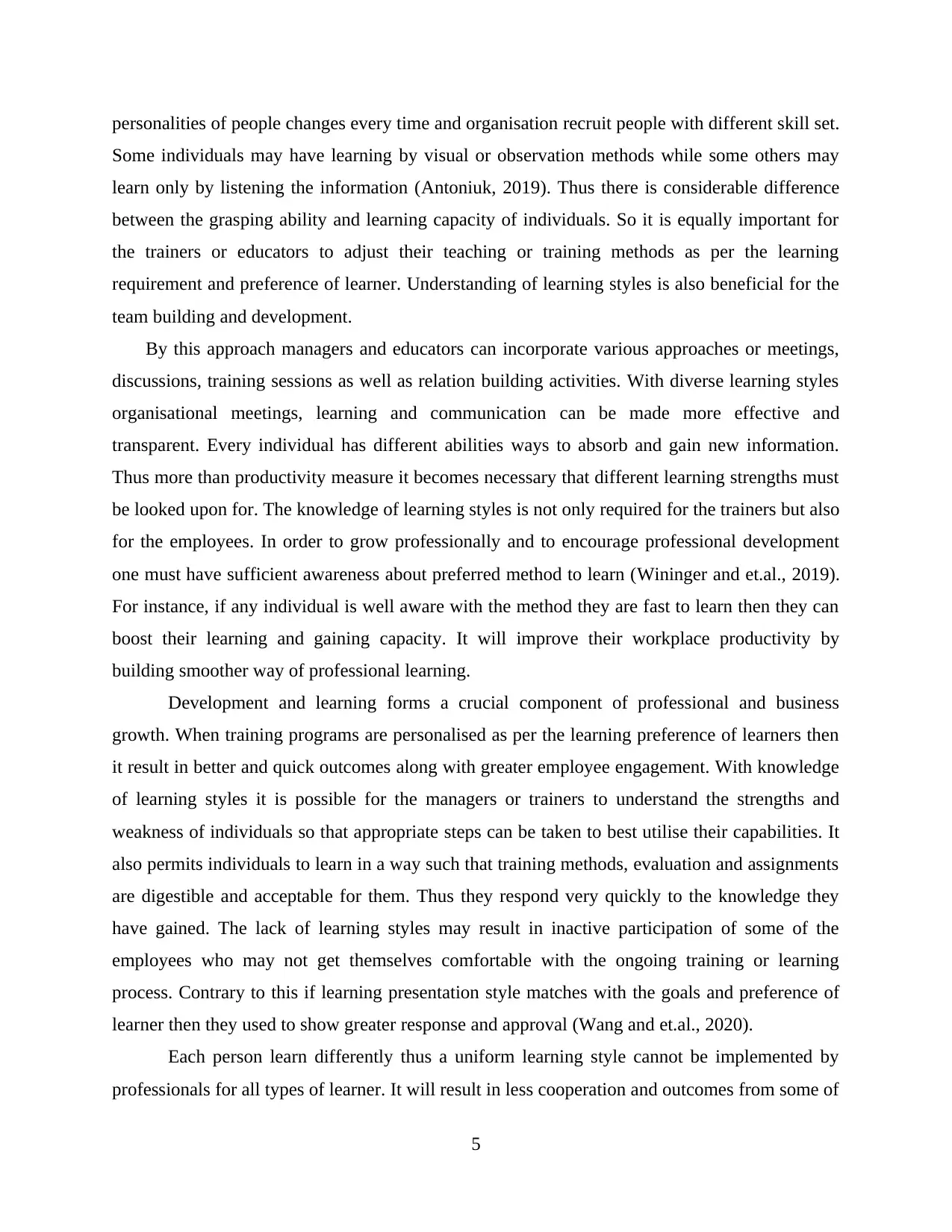
personalities of people changes every time and organisation recruit people with different skill set.
Some individuals may have learning by visual or observation methods while some others may
learn only by listening the information (Antoniuk, 2019). Thus there is considerable difference
between the grasping ability and learning capacity of individuals. So it is equally important for
the trainers or educators to adjust their teaching or training methods as per the learning
requirement and preference of learner. Understanding of learning styles is also beneficial for the
team building and development.
By this approach managers and educators can incorporate various approaches or meetings,
discussions, training sessions as well as relation building activities. With diverse learning styles
organisational meetings, learning and communication can be made more effective and
transparent. Every individual has different abilities ways to absorb and gain new information.
Thus more than productivity measure it becomes necessary that different learning strengths must
be looked upon for. The knowledge of learning styles is not only required for the trainers but also
for the employees. In order to grow professionally and to encourage professional development
one must have sufficient awareness about preferred method to learn (Wininger and et.al., 2019).
For instance, if any individual is well aware with the method they are fast to learn then they can
boost their learning and gaining capacity. It will improve their workplace productivity by
building smoother way of professional learning.
Development and learning forms a crucial component of professional and business
growth. When training programs are personalised as per the learning preference of learners then
it result in better and quick outcomes along with greater employee engagement. With knowledge
of learning styles it is possible for the managers or trainers to understand the strengths and
weakness of individuals so that appropriate steps can be taken to best utilise their capabilities. It
also permits individuals to learn in a way such that training methods, evaluation and assignments
are digestible and acceptable for them. Thus they respond very quickly to the knowledge they
have gained. The lack of learning styles may result in inactive participation of some of the
employees who may not get themselves comfortable with the ongoing training or learning
process. Contrary to this if learning presentation style matches with the goals and preference of
learner then they used to show greater response and approval (Wang and et.al., 2020).
Each person learn differently thus a uniform learning style cannot be implemented by
professionals for all types of learner. It will result in less cooperation and outcomes from some of
5
Some individuals may have learning by visual or observation methods while some others may
learn only by listening the information (Antoniuk, 2019). Thus there is considerable difference
between the grasping ability and learning capacity of individuals. So it is equally important for
the trainers or educators to adjust their teaching or training methods as per the learning
requirement and preference of learner. Understanding of learning styles is also beneficial for the
team building and development.
By this approach managers and educators can incorporate various approaches or meetings,
discussions, training sessions as well as relation building activities. With diverse learning styles
organisational meetings, learning and communication can be made more effective and
transparent. Every individual has different abilities ways to absorb and gain new information.
Thus more than productivity measure it becomes necessary that different learning strengths must
be looked upon for. The knowledge of learning styles is not only required for the trainers but also
for the employees. In order to grow professionally and to encourage professional development
one must have sufficient awareness about preferred method to learn (Wininger and et.al., 2019).
For instance, if any individual is well aware with the method they are fast to learn then they can
boost their learning and gaining capacity. It will improve their workplace productivity by
building smoother way of professional learning.
Development and learning forms a crucial component of professional and business
growth. When training programs are personalised as per the learning preference of learners then
it result in better and quick outcomes along with greater employee engagement. With knowledge
of learning styles it is possible for the managers or trainers to understand the strengths and
weakness of individuals so that appropriate steps can be taken to best utilise their capabilities. It
also permits individuals to learn in a way such that training methods, evaluation and assignments
are digestible and acceptable for them. Thus they respond very quickly to the knowledge they
have gained. The lack of learning styles may result in inactive participation of some of the
employees who may not get themselves comfortable with the ongoing training or learning
process. Contrary to this if learning presentation style matches with the goals and preference of
learner then they used to show greater response and approval (Wang and et.al., 2020).
Each person learn differently thus a uniform learning style cannot be implemented by
professionals for all types of learner. It will result in less cooperation and outcomes from some of
5
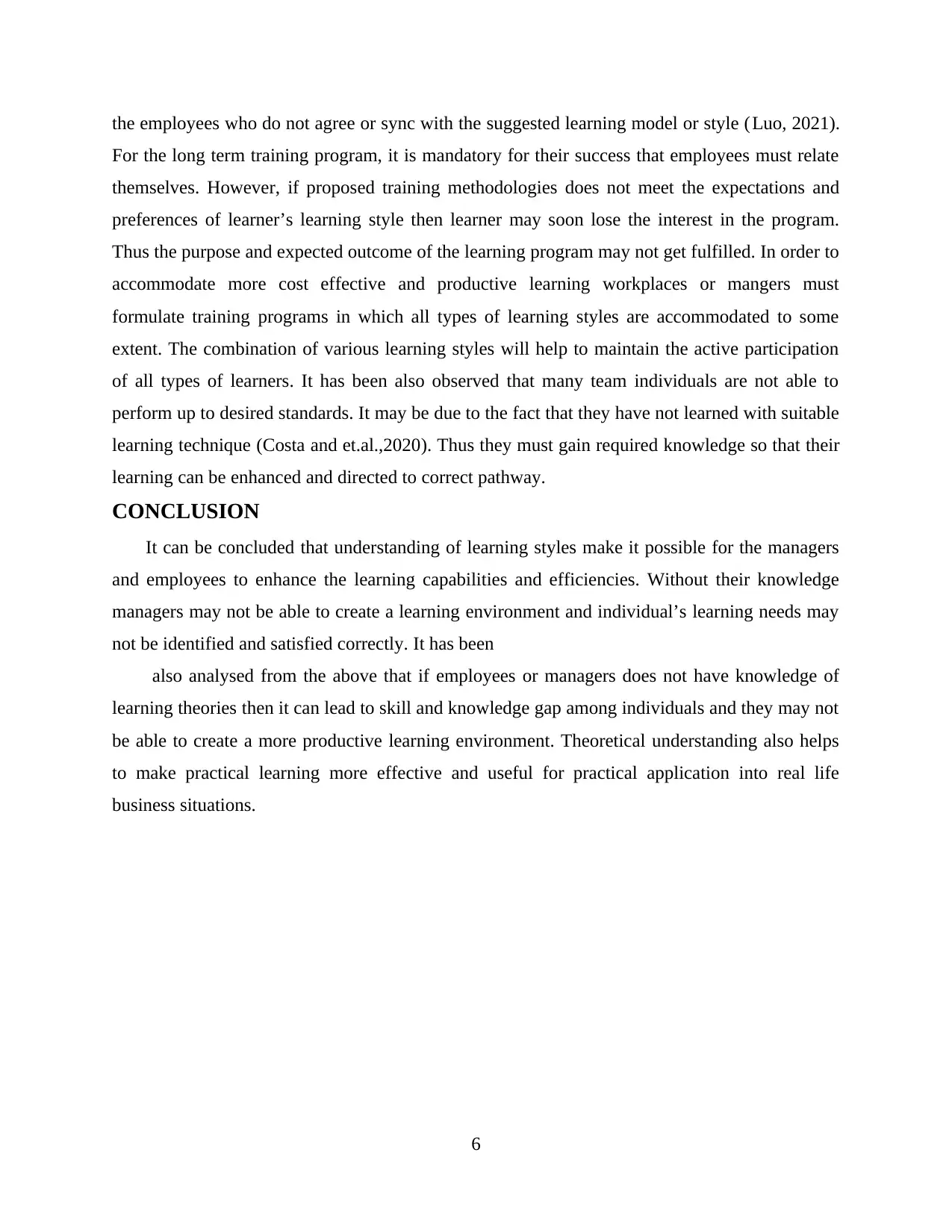
the employees who do not agree or sync with the suggested learning model or style (Luo, 2021).
For the long term training program, it is mandatory for their success that employees must relate
themselves. However, if proposed training methodologies does not meet the expectations and
preferences of learner’s learning style then learner may soon lose the interest in the program.
Thus the purpose and expected outcome of the learning program may not get fulfilled. In order to
accommodate more cost effective and productive learning workplaces or mangers must
formulate training programs in which all types of learning styles are accommodated to some
extent. The combination of various learning styles will help to maintain the active participation
of all types of learners. It has been also observed that many team individuals are not able to
perform up to desired standards. It may be due to the fact that they have not learned with suitable
learning technique (Costa and et.al.,2020). Thus they must gain required knowledge so that their
learning can be enhanced and directed to correct pathway.
CONCLUSION
It can be concluded that understanding of learning styles make it possible for the managers
and employees to enhance the learning capabilities and efficiencies. Without their knowledge
managers may not be able to create a learning environment and individual’s learning needs may
not be identified and satisfied correctly. It has been
also analysed from the above that if employees or managers does not have knowledge of
learning theories then it can lead to skill and knowledge gap among individuals and they may not
be able to create a more productive learning environment. Theoretical understanding also helps
to make practical learning more effective and useful for practical application into real life
business situations.
6
For the long term training program, it is mandatory for their success that employees must relate
themselves. However, if proposed training methodologies does not meet the expectations and
preferences of learner’s learning style then learner may soon lose the interest in the program.
Thus the purpose and expected outcome of the learning program may not get fulfilled. In order to
accommodate more cost effective and productive learning workplaces or mangers must
formulate training programs in which all types of learning styles are accommodated to some
extent. The combination of various learning styles will help to maintain the active participation
of all types of learners. It has been also observed that many team individuals are not able to
perform up to desired standards. It may be due to the fact that they have not learned with suitable
learning technique (Costa and et.al.,2020). Thus they must gain required knowledge so that their
learning can be enhanced and directed to correct pathway.
CONCLUSION
It can be concluded that understanding of learning styles make it possible for the managers
and employees to enhance the learning capabilities and efficiencies. Without their knowledge
managers may not be able to create a learning environment and individual’s learning needs may
not be identified and satisfied correctly. It has been
also analysed from the above that if employees or managers does not have knowledge of
learning theories then it can lead to skill and knowledge gap among individuals and they may not
be able to create a more productive learning environment. Theoretical understanding also helps
to make practical learning more effective and useful for practical application into real life
business situations.
6
⊘ This is a preview!⊘
Do you want full access?
Subscribe today to unlock all pages.

Trusted by 1+ million students worldwide
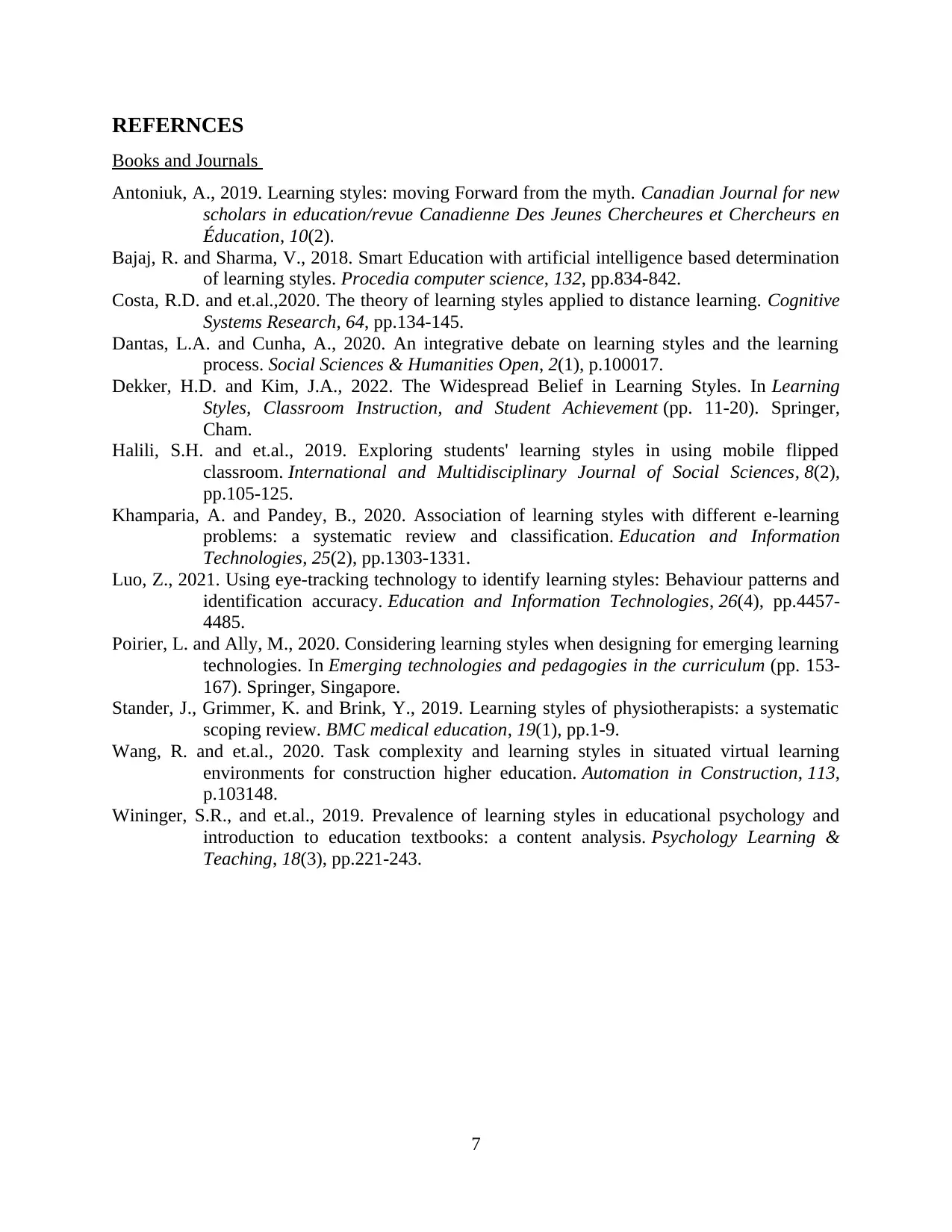
REFERNCES
Books and Journals
Antoniuk, A., 2019. Learning styles: moving Forward from the myth. Canadian Journal for new
scholars in education/revue Canadienne Des Jeunes Chercheures et Chercheurs en
Éducation, 10(2).
Bajaj, R. and Sharma, V., 2018. Smart Education with artificial intelligence based determination
of learning styles. Procedia computer science, 132, pp.834-842.
Costa, R.D. and et.al.,2020. The theory of learning styles applied to distance learning. Cognitive
Systems Research, 64, pp.134-145.
Dantas, L.A. and Cunha, A., 2020. An integrative debate on learning styles and the learning
process. Social Sciences & Humanities Open, 2(1), p.100017.
Dekker, H.D. and Kim, J.A., 2022. The Widespread Belief in Learning Styles. In Learning
Styles, Classroom Instruction, and Student Achievement (pp. 11-20). Springer,
Cham.
Halili, S.H. and et.al., 2019. Exploring students' learning styles in using mobile flipped
classroom. International and Multidisciplinary Journal of Social Sciences, 8(2),
pp.105-125.
Khamparia, A. and Pandey, B., 2020. Association of learning styles with different e-learning
problems: a systematic review and classification. Education and Information
Technologies, 25(2), pp.1303-1331.
Luo, Z., 2021. Using eye-tracking technology to identify learning styles: Behaviour patterns and
identification accuracy. Education and Information Technologies, 26(4), pp.4457-
4485.
Poirier, L. and Ally, M., 2020. Considering learning styles when designing for emerging learning
technologies. In Emerging technologies and pedagogies in the curriculum (pp. 153-
167). Springer, Singapore.
Stander, J., Grimmer, K. and Brink, Y., 2019. Learning styles of physiotherapists: a systematic
scoping review. BMC medical education, 19(1), pp.1-9.
Wang, R. and et.al., 2020. Task complexity and learning styles in situated virtual learning
environments for construction higher education. Automation in Construction, 113,
p.103148.
Wininger, S.R., and et.al., 2019. Prevalence of learning styles in educational psychology and
introduction to education textbooks: a content analysis. Psychology Learning &
Teaching, 18(3), pp.221-243.
7
Books and Journals
Antoniuk, A., 2019. Learning styles: moving Forward from the myth. Canadian Journal for new
scholars in education/revue Canadienne Des Jeunes Chercheures et Chercheurs en
Éducation, 10(2).
Bajaj, R. and Sharma, V., 2018. Smart Education with artificial intelligence based determination
of learning styles. Procedia computer science, 132, pp.834-842.
Costa, R.D. and et.al.,2020. The theory of learning styles applied to distance learning. Cognitive
Systems Research, 64, pp.134-145.
Dantas, L.A. and Cunha, A., 2020. An integrative debate on learning styles and the learning
process. Social Sciences & Humanities Open, 2(1), p.100017.
Dekker, H.D. and Kim, J.A., 2022. The Widespread Belief in Learning Styles. In Learning
Styles, Classroom Instruction, and Student Achievement (pp. 11-20). Springer,
Cham.
Halili, S.H. and et.al., 2019. Exploring students' learning styles in using mobile flipped
classroom. International and Multidisciplinary Journal of Social Sciences, 8(2),
pp.105-125.
Khamparia, A. and Pandey, B., 2020. Association of learning styles with different e-learning
problems: a systematic review and classification. Education and Information
Technologies, 25(2), pp.1303-1331.
Luo, Z., 2021. Using eye-tracking technology to identify learning styles: Behaviour patterns and
identification accuracy. Education and Information Technologies, 26(4), pp.4457-
4485.
Poirier, L. and Ally, M., 2020. Considering learning styles when designing for emerging learning
technologies. In Emerging technologies and pedagogies in the curriculum (pp. 153-
167). Springer, Singapore.
Stander, J., Grimmer, K. and Brink, Y., 2019. Learning styles of physiotherapists: a systematic
scoping review. BMC medical education, 19(1), pp.1-9.
Wang, R. and et.al., 2020. Task complexity and learning styles in situated virtual learning
environments for construction higher education. Automation in Construction, 113,
p.103148.
Wininger, S.R., and et.al., 2019. Prevalence of learning styles in educational psychology and
introduction to education textbooks: a content analysis. Psychology Learning &
Teaching, 18(3), pp.221-243.
7
1 out of 7
Related Documents
Your All-in-One AI-Powered Toolkit for Academic Success.
+13062052269
info@desklib.com
Available 24*7 on WhatsApp / Email
![[object Object]](/_next/static/media/star-bottom.7253800d.svg)
Unlock your academic potential
Copyright © 2020–2026 A2Z Services. All Rights Reserved. Developed and managed by ZUCOL.





